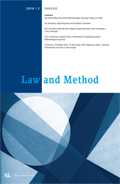|
This contribution explores the possibility of teaching international law in a critical fashion. I examine whether the training which is taking place at law schools is establishing and sustaining a cultural hegemony (a term borrowed from Antonio Gramsci). I ask whether the current focus on technical practice-oriented teaching is a condition which should be questioned, even disrupted? In my thoughts on reorientations of this culture, a central term is the German word Bildung. Bildung refers to knowledge and education as an end in itself (John Dewey) as well as an organic process (Hegel), and therefore incorporates a wider understanding than the English word ‘education’. In terms of international law, a notion of Bildung allows us to acknowledge the political nature of the discipline; it may even allow us to ‘politicize’ our students. |

| Diversen |
|
| Authors | Lisanne Groen |
| Author's information |
| Artikel |
|
| Keywords | Bildung, cultural hegemony, international law, teaching |
| Authors | Christine E.J. Schwöbel-Patel |
| AbstractAuthor's information |
| Artikel |
|
| Keywords | academic learning, skepticism, Oakeshott, judgment, Critique |
| Authors | Bart van Klink and Bald de Vries |
| AbstractAuthor's information |
|
Law teachers at the university want students to develop a critical attitude. But what exactly does it mean to be critical and why is it important to be critical? How can a critical attitude be promoted? In this article we intend to elucidate the role that critical thinking may play in legal education. We will introduce the idea of skeptical legal education, which is to a large extent based on Michael Oakeshott’s understanding of liberal learning but which relativizes its insistence on the non-instrumentality of learning and reinforces its critical potential. Subsequently, the article presents a teaching experiment, where students, based on self-organization, study and discuss basic texts in order to encourage critical thinking. |
| Artikel |
|
| Keywords | empirical facts, research methods, legal education, social facts |
| Authors | Terry Hutchinson |
| AbstractAuthor's information |
|
This article examines the importance of the social evidence base in relation to the development of the law. It argues that there is a need for those lawyers who play a part in law reform (legislators and those involved in the law reform process) and for those who play a part in formulating policy-based common law rules (judges and practitioners) to know more about how facts are established in the social sciences. It argues that lawyers need sufficient knowledge and skills in order to be able to critically assess the facts and evidence base when examining new legislation and also when preparing, arguing and determining the outcomes of legal disputes. For this reason the article argues that lawyers need enhanced training in empirical methodologies in order to function effectively in modern legal contexts. |
| Artikel |
|
| Keywords | governmentality, methodology, method, skill |
| Authors | Bal Sokhi-Bulley |
| AbstractAuthor's information |
|
How can we teach critical legal education? The article tackles this key question by focusing on the role of methodology in legal education and research. I argue that critical legal education requires marketing methodology as a ‘skill’, thereby freeing it from what students and researchers in Law often view as the negative connotations of ‘theory’. This skill requires exploring ‘alternative methodologies’ – those critical perspectives that depart from legal positivism and which Law traditionally regards as ‘peripheral’. As an example, the article explores the Foucauldian concept of governmentality as a useful methodological tool. The article also discusses the difference between theory, methodology and method, and reviews current academic contributions on law and method(ology). Ultimately, it suggests a need for a ‘revolt of conduct’ in legal education. Perhaps then we might hope for students that are not docile and disengaged (despite being successful lawyers) but, rather, able to nurture an attitude that allows for ‘thinking’ (law) critically. |
| Artikel |
|
| Keywords | legal dogmatics, theory design, academic education, empirical cycle |
| Authors | Jan Struiksma |
| AbstractAuthor's information |
|
Previously a model was developed whereby the evolution of dogmatic legal theory design can be made more explicit. This concerns, amongst other aspects, the application of the empirical cycle constructed by De Groot, which forms the final element of an evolution of the application of mundane knowledge to theory design. The starting point of this article is that this evolution must be ‘repeated’ during an academic study in empirical subjects. The objective is to investigate how this is done in the legal dogmatic education. |


